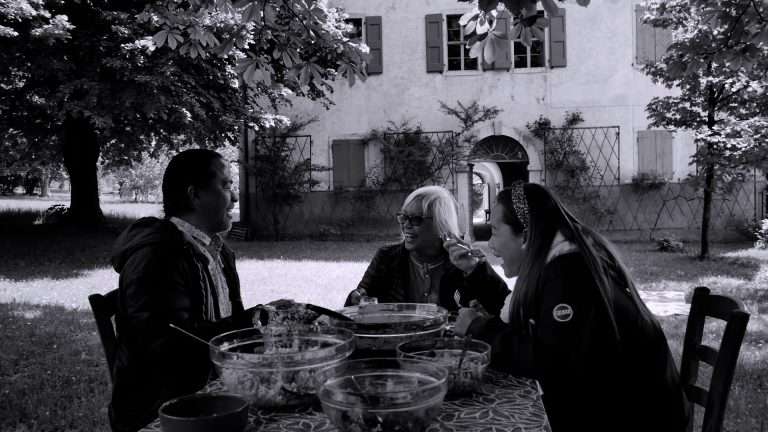Baritone horns and a 4:3 aspect ratio frame introduce us to the cozy, homely world of ‘Fremont,’ the fourth feature by the Iranian-British director Babak Jalali. California’s populous city becomes an inconspicuous stage for the Afghan communities; among those, we find the desperate for a dream young and cryptically insecure Donya (Anaita Wali Zada). Donya, now in her 20s, seems to be ready for her close-up with a significant other -or perhaps not.
In a film in which luck mostly means not good luck in reality and fortune cookies in real work, Donya is a worker at a small but successful Chinese fortune cookie company in neighboring San Francisco. Her more ebullient friend, Joanna (Hilda Schmelling), thinks of potential dates and makes fun of shrinks. On the contrary, Donya needs psychiatric help -but only as a means to end. A sleeping pills prescription is what she’s after, and her psychiatrist (the deadpan persona of stand-up comedian and punk music artist Gregg Turkington) knows how to make this a comic event by citing Jack London’s ‘White Fang’ and unwrapping fortune cookies -with his bare teeth.
How much Jarmuschian can you get? ‘Fremont’ has its sweet melancholy up its sleeve, simultaneously using some of the finest, one-shot comic gags of recent years. We witness the engaging facade behind the sour reality of an Afghan immigrant. Donay worked as a US translator (for the money) and managed to leave her country in one of the last evacuation flights before the Taliban took over again in 2021. She now feels guilty for being lucky (her family is still in danger back in Afghanistan), a fact that has dire consequences in her personal life -even if she has the wit to concoct one-liners like ‘I’m too busy with my social life to spend the time thinking.’
In reality, Donya’s social life could account for a small-scale indie neighborhood drama if Jalali and his co-screenwriter, Carolina Cavalli, had wanted to do so. Their secondary characters seem resigned and sweet in their inability to cope with the essentials (yet thinking of the others, like how not to maltreat a mouse) -and sometimes die to be narratively developed further. In her job navigation, Donya will soon be promoted from a plain worker to the ‘brain’ of the fortune cookie business -in a world where even the PCs look at ancient history and no smartphones are around. Her employers, a couple with diverging views of what to do with her, are firmly placed as the yin and yang approach to business making.

But a more appropriate title for this small-scale yet accurately pitched drama would be ‘Donya and the World.’ In one of the scenes between Donya and her employer, we suddenly watch her employee turn the globe into motion. And, while the film’s camera had a mostly reserved attitude in its movement, it now zooms and makes us watch in closeup the moving globe to the sound of words detailing the plight (and the connection) of the people with shared borders. It is the most simple-minded and one of the finely humane moments in a film, which moves back to its alternating sweet and sour journey after a while.
Anaita Wali Zada (in her acting debut) is photographed as an omnipresent mystery, and she plays it as if teasing everyone to decipher her poker face. There are not many big mysteries that need a solution in Jalali’s film. His insistence on directing and editing the here and now as if it were part of a one-way journey somehow robs the story of its own past, a fact that Joanna’s singing in front of Donya and Donya’s subsequent reaction perfectly reminds us of. While the film’s vistas perfectly carry the sense of modest abandonment, Donya’s sense of guilt as a survivor is a given, not a starter. The 4:3 aspect ratio makes Donya the film’s centerpiece, yet the film (like its main character) seems to cry for something more expository -and less subdued.
Here’s why the introduction of the love interest (in the film’s third part) is so refreshing. Jeremy Allen White does a very credible job of pinpointing Donya what she cannot articulate. Their chance encounter at a gas station and their joint time (at separate tables), each holding and caressing their respective glass, is another highlight of the film’s dictum that advanced responsibility comes with duality.
Music (composer: Mahmood Schricker) in both its jazzy brass variants and dreamy vocals supports the film’s duality between modern crassness and dreamed-of completeness. The same goes for the ethereal last shot of Donya, which brings more old-fashioned poetry back into the mix.
‘Fremont’ tries to work like a fortune cookie in its shots; you never know which one you’ll get (and the main character has some nasty surprises along the way). The film’s playful melancholy is delicious enough to keep the audience on board with Donya’s emotional travel. Its black-and-white identity ensures a cut to the essentials. Furthermore, its scope makes getting the nuts and bolts of things unnecessarily easy, but its execution won’t miss a beat.
![Mafioso [1962] Review – A Mesmerizing Cultural Comedy with a Bitter Edge](https://79468c92.delivery.rocketcdn.me/wp-content/uploads/2019/12/Mafioso-1962-768x576.jpeg)




